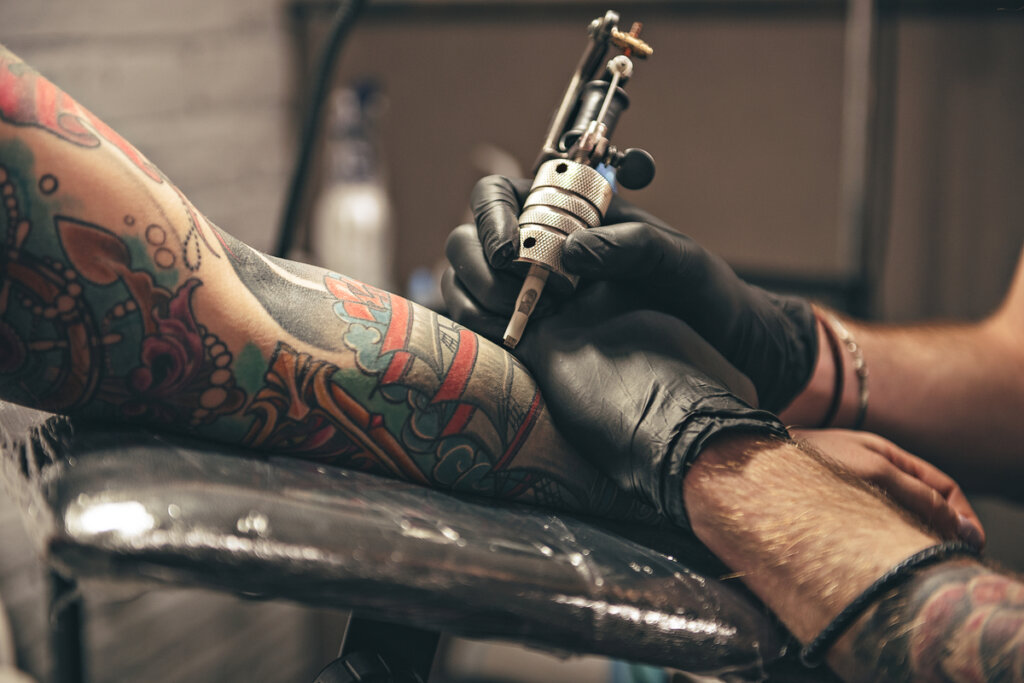Tattoos have existed for thousands of years. Indeed, the idea of adorning our skin with drawings is far from modern. However, over the last few decades, this practice has increased exponentially. Gone is its association with crime. Today, we all know someone with a tatoo.
Some people have tattoos to represent a memory, an idea, a relationship, or a significant story. Others simply have them with the idea of beautifying themselves. Whatever the reason, tattoos allow us to express who we are. Consequently, the tattoos themselves usually have a really marked relationship with identity.
However, it’s often claimed that having tattoos can become a kind of addiction. People are told, “Once you have one, you won’t be able to stop”. Therefore, today we want to ask if this addiction really exists and, if so, what its consequences might be.
Why do we get tattoos?
The use and meaning of tattoos has evolved over time. Today, although it’s not only young people who get them, this is the sector of the population in which they’re most prevalent. Indeed, we’re no longer surprised to walk down the street in summer and see arms and legs covered in drawings. Some people even have them on their face.
There are many motivations for a person to get tattooed. Pérez Fonseca (2009) has investigated them, and compiled a substantial list. One of the most important is connected with our need to differentiate ourselves from the rest, to be and feel singular and unique. It’s like having our own personal brand, which represents a part of our identity. At other times, people get tattoos for aesthetic reasons.
Many teenagers get tattooed to feel part of a group of friends. The same thing usually happens with piercings. In fact, it’s quite curious that the tattoo can respond to the need to feel different, yet, at the same time, the desire to feel similar. Another possible motivation might be the attempt to strengthen themselves against a real experience that’s causing them pain.
The motivation may be associated with representing an event. For example, dates of certain events and names of people important to the individual are frequently depicted in the form of tattoos. Alternatively, if the person has overcome a traumatic or difficult event, is making an important change in their life, or wants to remind themselves of their own personal story, they might get tattooed.
Does addiction to tattoos exist?
Before inquiring about the possible addiction to tattoos, we must be clear about what we mean by this term. Addiction is a persistent dependence on a particular substance or behavior. The compulsive consumption of food, drugs, and alcohol are among the most frequent. However, there are many other addictions that tend to go unnoticed.
For a certain behavior to be considered addictive, it’s necessary that it meets a series of criteria:
- Dependency. The individual’s well-being begins to depend exclusively on the addictive component. In fact, it virtually becomes the most important thing in their life and they feel a compelling need to turn to the substance or behavior to stay calm
- Tolerance. They require increasing amounts of the substance or behavior to obtain the desired effect. That’s because the effect of the same amount decreases markedly with continued use.
- Abstinence. They find it extremely difficult to maintain abstinence from the substance or behavior. In fact, the non-satisfaction of this need causes them deep physical and mental suffering. Consequently, they’re unsuccessful when they try and stop the use of the substance or the problematic behavior due to a lack of control.
- Negative effects. Addiction has a significant and negative impact on many areas of their life. This means they experience discomfort and have difficulties in sustaining daily activities in a harmonious and responsible manner.

How we relate to tattoos
As you can see, the notion of addiction reflects a particular way of relating to something or someone, which involves dependency. It can involve substances, behaviors, or people.
Although there’s no definitive research on the matter, many professionals in psychiatry and psychology have expressed their points of view regarding the existence of tattoo addiction. For one thing, the process of etching them onto the skin has been found to release adrenaline and endorphins. This provides a pleasant body sensation, at the same time helping the individual deal with the pain of having the tattoo.
Dr. Mark D. Griffiths believes, that for many people, getting tattoos may be more of a passion than a problem and that they don’t meet the criteria for addiction.
“While many behaviors can become impulsive, addiction depends on constant rewards or reinforcement. People with substance use disorders or gambling addiction fuel their habits with frequent (at least short-term) rewarding experiences, but even the most tattooed girls don’t engage in the behavior on a regular basis.”
-Mark D. Griffiths-
We know that many people acquire a certain taste for frequently having tattoos and, as soon as they have one tattoo, they’re thinking about the next one. However, the same thing usually happens to us every time we leave the cinema having seen a movie that we really liked. Indeed, we leave the theater, eagerly awaiting its sequel.
In conclusion, we can confidently state that art tends to be linked more with passion and the search and expression of our identity than with addiction.
The post Tattoo Addiction: Does It Really Exist? appeared first on Exploring your mind.



















Comments